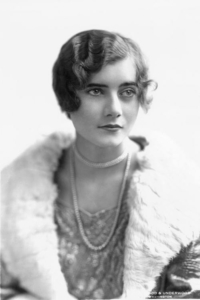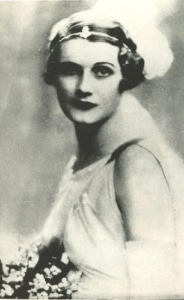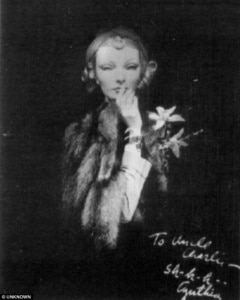DCPA NEWS CENTER
Enjoy the best stories and perspectives from the theatre world today.
Enjoy the best stories and perspectives from the theatre world today.
From the archives: this article was originally published on February 3, 2022

The subject of Rubicon has been called “honeypot,” “Minnesota Mata Hari,” and “the greatest unsung heroine of the war”
Her exploits are straight out of a James Bond movie. Elizabeth – Betty for short – Pack was a spy for the British in World War II, and now she is the subject of a new play.
Rubicon by Kirsten Potter was a featured reading at the DCPA Theatre Company’s 2022 Colorado New Play Summit. Now, the play will premiere in the Kilstrom Theatre on February 9.
Based on a true story, Rubicon tracks the early career of one of history’s most effective spies. It follows Betty as she transitions from a Major’s daughter and society wife to a steely, seductive agent.
She was born Amy Elizabeth Thorpe in Minneapolis to the daughter of a Senator and a Marine Corps officer in 1910. Betty’s family relocated in 1923 to Washington DC, where she was known in society to be both mature and promiscuous. After getting pregnant at 19 by an unknown partner, she married British operative Arthur Pack who was 19 years her senior.
Soon, his career took the already estranged couple to Spain in 1934 at the onset of the Spanish Civil War. Betty’s activism began while in Madrid, where she smuggled rebel Nationalists to safety, transported Red Cross supplies to Franco’s forces, and coordinated the naval evacuation of the British embassy staff.

When her husband was reassigned to Warsaw, Poland, Betty was soon enlisted to become a British spy – codename Cynthia. She quickly befriended her targets, using her ability to attract and seduce men, granting her easy access to all of the embassies and critical information. Of her first target, she said, “Our meetings were very fruitful, and I let him make love to me as often as he wanted, since this guaranteed the smooth flow of political information I needed.”
While in Poland, she was asked to befriend a colleague of the Polish foreign minister from whom she successfully extracted information about the Enigma machine and Hitler’s plans to dismantle the former Czechoslovakia.
Ultimately, her assignments took her back to Washington, DC, where she obtained codebooks to the Italian cryptosystems, allowing Britain’s Royal Navy to defeat the Italians at the Battle of Cape Matapan.
While in DC, she was tapped to conduct what would become her most sensational (some might say “notorious”) escapade. Following France’s collapse in 1940, the Vichy French government was extremely anti-British. She was to pose as an American journalist and gain the confidence of someone within the Vichy French embassy. She did so by seducing Charles Brousse, a press attaché at the embassy. After gaining his trust, she confided that she was working as an American spy. Given the anti-British sentiment, Brousse was more than happy to provide information about the embassy’s activities and personnel.
But soon, MI6 wanted something more substantial: the Vichy French naval codes.
Enlisting Brousse’s help, the duo planned an elaborate scheme. Brousse told the embassy he needed a place to conduct an affair in secret, and they began frequenting the embassy. After Brousse and Betty had laid the groundwork for their tryst, they planned to drug the night watchman, bring in a safecracker, extract the codebooks, remove them to a nearby room to be copied, and return them unnoticed.
 After two unsuccessful attempts, the pair tried a third time. Suspecting something was not quite right, Betty paused during their burglary, disrobed and encouraged Brousse to do the same. Suddenly, a guard entered the room. Clothed in nothing but a pearl necklace and high heels, the pair pretended to be caught in flagrante delicto…and it worked! The embarrassed guard left them to continue his rounds, allowing them time to extract the materials. The codebooks helped the British and American forces plan “Operation Torch” on the coast of North Africa, successfully landing troops on the beaches east and west of Algiers.
After two unsuccessful attempts, the pair tried a third time. Suspecting something was not quite right, Betty paused during their burglary, disrobed and encouraged Brousse to do the same. Suddenly, a guard entered the room. Clothed in nothing but a pearl necklace and high heels, the pair pretended to be caught in flagrante delicto…and it worked! The embarrassed guard left them to continue his rounds, allowing them time to extract the materials. The codebooks helped the British and American forces plan “Operation Torch” on the coast of North Africa, successfully landing troops on the beaches east and west of Algiers.
Betty wished to continue her work as a spy, but by the end of World War II, she was too well known to effectively work undercover. She even spent an evening drinking martinis with then-President Franklin Roosevelt and recanting her tales of espionage.
She spent the rest of her life quietly. Betty’s estranged husband, Arthur, committed suicide in 1945. She ultimately married Brousse and they lived together in France until their deaths.
When asked if she was ashamed of the methods she used to extract information, she said: “Not in the least. My superiors told me that the results of my work saved thousands of British and American lives…. It involved me in situations from which ‘respectable’ women draw back — but mine was total commitment. Wars are not won by respectable methods.”
DETAILS
Rubicon
Kilstrom Theatre
Feb 9 – March 10
Tickets
